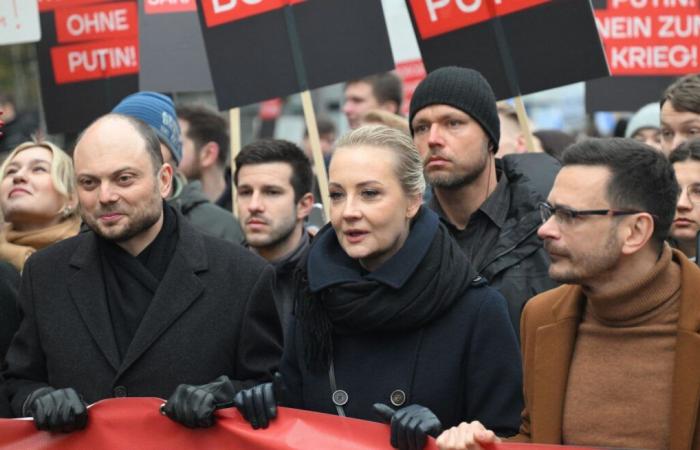More than a thousand supporters of the Russian opposition in exile, led in particular by Yulia Navalnaïa, marched in Berlin on Sunday against Vladimir Putin and against the war in Ukraine, a limited turnout for a weakened movement which hoped to revive.
Participants in this march marched through the center of the German capital shouting “No to war!” », “Russia without Putin!” » and “Russia will be free!” », before ending in front of the Russian embassy, noted AFP journalists.
Organizers put their number at up to 2,000, far fewer than in previous large opposition-led protests in Russia in 2021 — even as Berlin hosts a multitude of Russian exiles.
The opposition, which lost its figurehead, Alexeï Navalny, in February, who died in murky circumstances in prison, is repressed in Russia and is trying to relaunch the movement from abroad.
Yulia Navalnaïa, the widow of this opponent who took over the reins of her movement, led the procession with the other initiators of the mobilization: Ilia Iachine, a former Moscow municipal deputy recently released from prison, and Vladimir Kara-Mourza, a longtime Kremlin critic who survived prison and two poisoning attempts.
“We must fight against Putin’s regime […]fight against this war that Putin has started against Ukraine! », exclaimed Ms Navalnaïa to the crowd. “We are here to say that Putin is a war criminal. His place is not in the Kremlin but in prison,” said Mr. Yashin.
This demonstration, the first major protest action organized by the Russian opposition abroad, aimed to demand the “immediate withdrawal” of Russian troops from Ukraine, the dismissal and trial of Vladimir Putin and the release of all political prisoners in Russia.
“Took our freedom”
“It is important to show that Russians and Russian-speakers are not all for Putin but that they also defend liberal democratic values, that they are against the war,” testified one demonstrator, Polina Zelenskaïa, a Russian-speaking student from 21 years old from Estonia.
Another protester, Dmitri Tolmatchiov, a 55-year-old entrepreneur who left Russia three years ago facing the threat of legal action over his activism, said it was his “duty” to protest in the name of those who cannot do so in their country.
“If we do nothing, nothing will change,” he explained to AFP.
“Putin not only took their country from the Ukrainians, he also took our freedom,” added Valéria Alyochina, a 30-year-old Russian who arrived from Nice, in the south-east of France.
Russian power has methodically eradicated any protest movement in recent years, throwing hundreds, even thousands, of people behind bars.
“Political force”
“It was very important for us to show that we are numerous, that we are capable of consolidating ourselves and that we are a real political force,” Mr. Iachine said after the demonstration.
Beyond the slogans, the Russian opposition is struggling to propose a concrete approach that should lead to the end of the war and the departure of Vladimir Putin. Yulia Navalnaïa admitted in an interview with the opposition television channel Dojd on Wednesday that she did not have a “plan” in this sense.
Kremlin spokesperson Dmitri Peskov on Wednesday mocked opponents who were “monstrously detached from their country” and whose “opinion has no importance”.
Several scandals within the Russian opposition have also weakened it and caused frustration among some of its activists.
In question, the attack with a hammer on an ally of Alexeï Navalny, the victim having pointed the finger at the movement of the ex-oligarch Mikhail Khodorkovsky. Or these accusations against the anti-corruption foundation of the late opponent which allegedly covered up the machinations of crooked bankers in Russia.
Another difficulty for the opposition: its reluctance to provide greater support to Ukraine, beyond its demand for an “immediate end” to the conflict. Such support could alienate him from the Russian population and destroy any hope of a future political career in a post-Putin Russia.
The march was also harshly criticized by the Ukrainian ambassador to Germany, Oleksiï Makeïev, who spoke in the columns of Zeit of a “walk without dignity and without consequences”.






